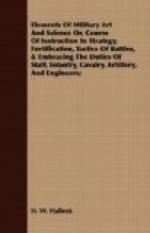The following maxims on battles may be studied with advantage:—1st. General battles are not to be fought but under the occurrence of one of the following circumstances: when you are, from any cause, decidedly superior to the enemy; when he is on the point of receiving reinforcements, which will materially effect your relative strength; when, if not beaten or checked, he will deprive you of supplies or reinforcements, necessary to the continuance or success of your operations; and, generally, when the advantage of winning the battle will be greater than the disadvantage of losing it.
2d. Whatever may be your reason for risking a general battle, you ought to regard as indispensable preliminaries,—a thorough knowledge of the ground on which you are to act; an ample supply of ammunition; the most perfect order in your fire-arms; hospital depots regularly established, with surgeons, nurses, dressings, &c., sufficient for the accommodation of the wounded; points of rendezvous established and known to the commanders of corps; and an entire possession of the passes in your own rear.
3d. The battle being fought and won, the victory must be followed up with as much alacrity and vigor, as though nothing had been gained,—a maxim very difficult of observance, (from the momentary disobedience which pervades all troops flushed with conquest,) but with which an able general will never dispense. No one knew better the use of this maxim than Napoleon, and no one was a more strict and habitual observer of it.
4th. The battle being fought and lost, it is your first duty to do away the moral effect of defeat,—the want of that self-respect and self-confidence, which are its immediate followers, and which, so long as they last, are the most powerful auxiliaries of your enemy. It is scarcely necessary to remark that, to effect this object,—to reinspire a beaten army with hope, and to reassure it of victory,—we must not turn our backs on an enemy, without sometimes presenting to him our front also;—we must not confide our safety to mere flight, but adopt such measures as shall convince him that though wounded and overpowered, we are neither disabled nor dismayed; and that we still possess enough both of strength and spirit to punish his faults, should he commit any. Do you operate in a covered or mountainous country?—avail yourself of its ridges and woods; for by doing so you will best evade the pressure of his cavalry. Have you defiles or villages to pass?—seize the heads of these, defend them obstinately, and make a show of fighting another battle. In a word, let no error of your enemy, nor any favorable incident of the ground, escape your notice or your use. It is by these means that your enemy is checked, and your troops inspirited; and it was by these that Frederick balanced his surprise at Hohenkirchen, and the defeat of his plans before Olmutz. The movement of our own Washington, after




